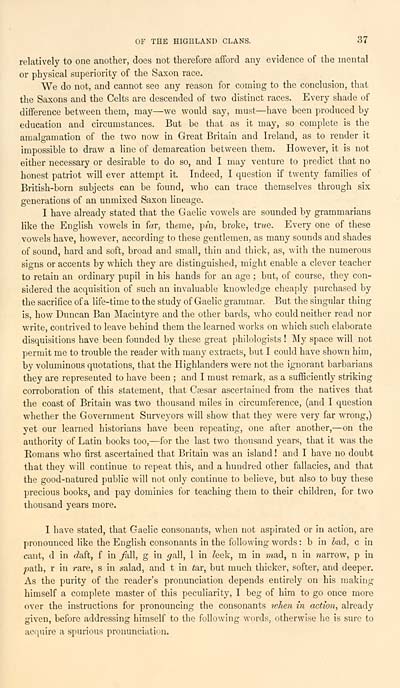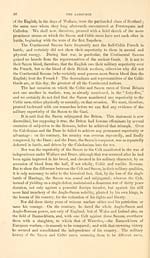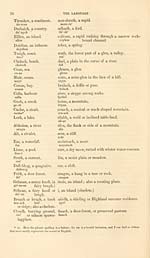Download files
Complete book:
Individual page:
Thumbnail gallery: Grid view | List view

OF THE HIGHLAND CLANS. 37
relatively to one another, does not therefore afford any evidence of the mental
or physical superiority of the Saxon race.
We do not, and cannot see any reason for coming to the conclusion, that
the Saxons and the Celts are descended of two distinct races. Every shade of
difference between them, may — we would say, must — have been produced by
education and circumstances. But be that as it may, so complete is the
amalgamation of the two now in Great Britain and Ireland, as to render it
impossible to draw a line of demarcation between them. However, it is not
either necessary or desirable to do so, and I may venture to predict that no
honest patriot will ever attempt it. Indeed, I question if twenty families of
British-born subjects can be found, who can trace themselves through six
genei-ations of an unmixed Saxon lineage.
I have already stated that the Gaelic vowels are sounded by grammarians
like the English vowels in far, theme, p/n, broke, trwe. Every one of these
vowels have, however, according to these gentlemen, as many sounds and shades
of sound, hard and soft, broad and small, thin and thick, as, with the numerous
signs or accents by which they are distinguished, might enable a clever teacher
to retain an ordinary pupil in his hands for an age ; but, of course, they con-
sidered the acquisition of such an invaluable knowledge cheaply purchased by
the sacrifice of a life-time to the study of Gaelic grammar. But the singular thing
is, how Duncan Ban Macintyre and the other bards, who could neither read nor
write, contrived to leave behind them the learned works on which such elaborate
disquisitions have been founded by these great philologists ! My space will not
permit me to trouble the reader with many extracts, but I could have shown him,
by voluminous quotations, that the Highlanders were not the ignorant barbarians
they are represented to have been ; and I must remark, as a sufficiently striking
corroboration of this statement, that Cfesar ascertained from the natives that
the coast of Britain was two thousand miles in circumference, (and I question
whether the Government Surveyors will show that they were very far wrong,)
yet our learned historians have been repeating, one after another, — on the
authority of Latin books too, — for the last two thousand years, that it was the
Romans who first ascertained that Britain was an island ! and I have no doubt
that they will continue to repeat this, and a hundred other fallacies, and that
the good-natured public will not only continue to believe, but also to buy these
})recious books, and pay dominies for teaching them to their children, for two
thousand years more.
I have stated, that Gaelic consonants, when not aspirated or in action, are
pronounced like the English consonants in the following words: b in bad, c in
cant, d in da.it, f in /all, g in ^'all, 1 in feek, m in «iad, n in «arrow, p in
;9ath, r in rare, s in salad, and t in <ar, but much thicker, softer, and deeper.
As the purity of the reader's pronunciation depends entirely on his making
himself a complete master of this peculiarity, I beg of him to go once more
over the instructions for pronouncing the consonants tvhen in action, already
given, before addressing himself to the following words, otherwise he is sure to
acquire a spurious pronunciation.
relatively to one another, does not therefore afford any evidence of the mental
or physical superiority of the Saxon race.
We do not, and cannot see any reason for coming to the conclusion, that
the Saxons and the Celts are descended of two distinct races. Every shade of
difference between them, may — we would say, must — have been produced by
education and circumstances. But be that as it may, so complete is the
amalgamation of the two now in Great Britain and Ireland, as to render it
impossible to draw a line of demarcation between them. However, it is not
either necessary or desirable to do so, and I may venture to predict that no
honest patriot will ever attempt it. Indeed, I question if twenty families of
British-born subjects can be found, who can trace themselves through six
genei-ations of an unmixed Saxon lineage.
I have already stated that the Gaelic vowels are sounded by grammarians
like the English vowels in far, theme, p/n, broke, trwe. Every one of these
vowels have, however, according to these gentlemen, as many sounds and shades
of sound, hard and soft, broad and small, thin and thick, as, with the numerous
signs or accents by which they are distinguished, might enable a clever teacher
to retain an ordinary pupil in his hands for an age ; but, of course, they con-
sidered the acquisition of such an invaluable knowledge cheaply purchased by
the sacrifice of a life-time to the study of Gaelic grammar. But the singular thing
is, how Duncan Ban Macintyre and the other bards, who could neither read nor
write, contrived to leave behind them the learned works on which such elaborate
disquisitions have been founded by these great philologists ! My space will not
permit me to trouble the reader with many extracts, but I could have shown him,
by voluminous quotations, that the Highlanders were not the ignorant barbarians
they are represented to have been ; and I must remark, as a sufficiently striking
corroboration of this statement, that Cfesar ascertained from the natives that
the coast of Britain was two thousand miles in circumference, (and I question
whether the Government Surveyors will show that they were very far wrong,)
yet our learned historians have been repeating, one after another, — on the
authority of Latin books too, — for the last two thousand years, that it was the
Romans who first ascertained that Britain was an island ! and I have no doubt
that they will continue to repeat this, and a hundred other fallacies, and that
the good-natured public will not only continue to believe, but also to buy these
})recious books, and pay dominies for teaching them to their children, for two
thousand years more.
I have stated, that Gaelic consonants, when not aspirated or in action, are
pronounced like the English consonants in the following words: b in bad, c in
cant, d in da.it, f in /all, g in ^'all, 1 in feek, m in «iad, n in «arrow, p in
;9ath, r in rare, s in salad, and t in <ar, but much thicker, softer, and deeper.
As the purity of the reader's pronunciation depends entirely on his making
himself a complete master of this peculiarity, I beg of him to go once more
over the instructions for pronouncing the consonants tvhen in action, already
given, before addressing himself to the following words, otherwise he is sure to
acquire a spurious pronunciation.
Set display mode to: Large image | Transcription
Images and transcriptions on this page, including medium image downloads, may be used under the Creative Commons Attribution 4.0 International Licence unless otherwise stated. ![]()
| Early Gaelic Book Collections > Blair Collection > Treatise on the language, poetry, and music of the Highland clans > (49) |
|---|
| Permanent URL | https://digital.nls.uk/76236942 |
|---|
| Description | A selection of books from a collection of more than 500 titles, mostly on religious and literary topics. Also includes some material dealing with other Celtic languages and societies. Collection created towards the end of the 19th century by Lady Evelyn Stewart Murray. |
|---|
| Description | Selected items from five 'Special and Named Printed Collections'. Includes books in Gaelic and other Celtic languages, works about the Gaels, their languages, literature, culture and history. |
|---|

